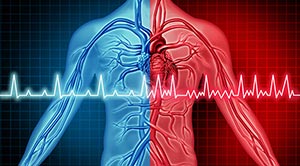 What is Atrial Fibrillation
What is Atrial Fibrillation
Atrial fibrillation is a condition in which your heart beats irregularly and rapidly, increasing your risk for heart failure, strokes, and other complications. The two upper chambers of the heart (atria) beat irregularly and out of sync with the two lower chambers of the heart (ventricles). A normal heart beat ranges from 60 to 100 beats per minute but a heart in atrial fibrillation ranges from 100 to 175 beats per minute.
Your heart has a natural pacemaker called the sinus node, which is a group of cells located in the upper right chamber of your heart (the right atrium). The sinus node produces the signal to start the heartbeat. The signal travels through the two upper heart chambers and then through the atrioventricular node (a small structure in the heart that serves as the gatekeeper between the upper and lower chambers). This causes your heart to contract which sends blood to your heart and body. During atrial fibrillation, the signals in the upper chambers of your heart are not being produced as normal, and as a result, the chambers beat rapidly and out of rhythm. The ventricles also beat rapidly, but not as rapidly as the upper chambers.
Atrial fibrillation may be:
- Occasional – symptoms come and go, lasting a few minutes to a few hours
- Persistent – your atrial fibrillation does not go away on its own, requiring medical treatment to return your heart to its normal rhythm
- Long-standing persistent – continuous and lasting longer than 12 months
- Permanent – the rhythm can not be restored, requires medications to manage heart rate and prevent blood clots
Symptoms
- Heart palpitations (a racing, uncomfortable, irregular heartbeat)
- Weakness
- Reduced ability to exercise
- Fatigue
- Lightheadedness
- Dizziness
- Shortness of breath
- Chest pain
Possible Causes
- High blood pressure
- Heart attack
- Coronary artery disease
- Abnormal heart valves
- Congenital heart defects
- Overactive thyroid gland or other metabolic imbalance
- Certain medications, caffeine, tobacco or alcohol
- Sick sinus syndrome — improper functioning of the heart’s natural pacemaker
- Lung diseases
- Previous heart surgery
- Viral infections
- Stress due to surgery, pneumonia or other illnesses
- Sleep apnea
Risk Factors
- Age
- Heart disease – heart valve problems, congenital heart disease, congestive heart failure, coronary artery disease, or a history of heart attack or heart surgery
- High blood pressure
- Thyroid problems, sleep apnea, metabolic syndrome, diabetes, chronic kidney disease or lung disease have an increased risk of atrial fibrillation.
- Drinking alcohol
- Obesity
- Family history
- Complications
Complications
Blood clots are a potential complication of atrial fibrillation and may circulate to other organs and lead to blocked blood flow.
Prevention
Atrial Fibrillation can cause stroke or heart failure. You can prevent atrial fibrillation by:
- Eating a heart-healthy diet
- Increasing your physical activity
- Avoiding smoking
- Maintaining a healthy weight
- Limiting or avoiding caffeine and alcohol
- Reducing stress
- Use over-the-counter cold and cough medicines with caution